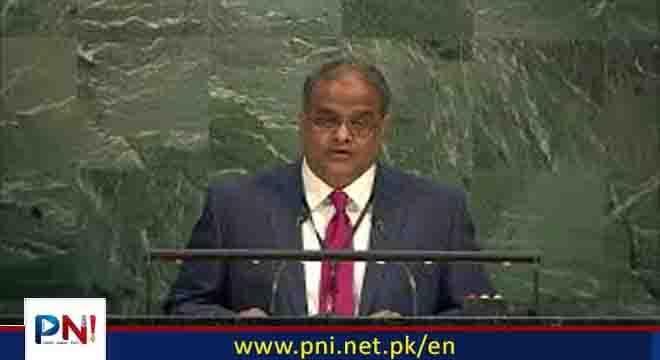UNITED NATIONS, Oct 10 : India’s refusal to implement UN Security Council’s resolutions on Jammu and Kashmir, which grant the Kashmiri people their right to self-determination, poses a threat to regional and international peace and security, a senior Pakistani diplomat told a UN committee.
“The situation in Jammu and Kashmir remains precarious; even a minor incident could trigger a wider conflict,” Ambassador Bilal Ahmad warned in a speech to the UN General Assembly’s First Committee, which deals with disarmament and international security matters, on Wednesday.
“This could assume dangerous dimensions and lead to a regional and global catastrophe,” said Ambassador Ahmad, who is Pakistan’s permanent representative to UN offices in Geneva, and is in New York for the First Committee assignment.
At the same time, he said, India is engaged in a massive arms build-up with 70 per cent of its military capabilities deployed against Pakistan.
Highlighting India’s rejection of dialogue, the Pakistani envoy, who was speaking in a general debate, said New Delhi threatens aggression against Pakistan.
In this regard, he cited the statements made by Indian foreign and defence ministers as well as the Army Chief threatening to cross the Line of Control (LoC) and “take-over” Azad Kashmir.
India’a massive arms build-up includes destabilizing weapons systems and technologies, he said, noting that it is the world’s largest arms importer.
“It (India) has been increasing readiness of its nuclear arsenal including through canisterization of its delivery systems despite a record of accidental launches”, he said, while adopting war fighting doctrines contemplating a limited war under the nuclear overhang.
Also, India has spurned Pakistan’s proposals for a mutual “Strategic Restraint Regime”, which is based on three interlocking and mutually reinforcing elements of conflict resolution, nuclear and missile restraint and conventional arms balance.
“Such a State can only be a ‘net destabilizer’ rather than a ‘net security provider’.” Ambassador Ahmad said. “Expecting it to play a counterbalancing role in the broader region through ensuring a generous supply of advanced weaponry and sensitive technologies is equally misguided.”
Pakistan, he said, cannot remain oblivious to such clear dangers to its security, and will maintain its capability of minimum credible deterrence against all forms of aggression.
“Despite continuing provocations, Pakistan desires, and is determined to pursue, peace, development and strategic stability in South Asia based on sovereign equality and mutual respect,” the Pakistani envoy said.
Such a peace can be built through:
— Resolving the outstanding disputes between Pakistan and India, especially the Jammu and Kashmir dispute in accordance with UNSC resolutions and the wishes of the Kashmiri people; and,
— Pursuing reciprocal measures for nuclear, missile and military restraints between the two countries, strengthening confidence building measures and translating them into a pact on avoidance of war.
Warning that the world stands on the “precipice of global catastrophe”, as age-old conflicts remain unresolved and new crises continue to emerge,he regretted that the Pact for the Future, adopted by world leaders last month, remained “deficient” in the areas of peace, security, and disarmament.
“It (the Pact) failed to address key ongoing disputes and conflicts, such as the genocidal war in Gaza, the wider conflict in the Middle East, conflicts in Europe, Africa, or South Asia—none of these have been effectively addressed by the Pact, Ambassador Ahmad said. “Nor did it tackle the breakdown of arms control, or the renewed, multi-dimensional, and global arms race.”
Follow the PNI Facebook page for the latest news and updates.








